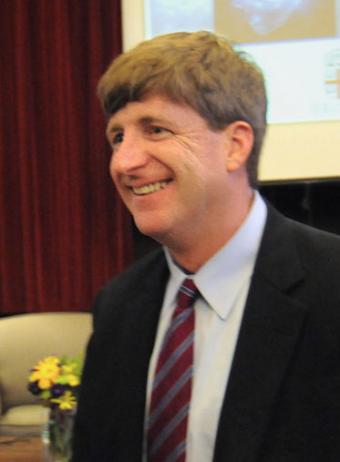PROVIDENCE, R.I. [Brown University] — Brown University today announced that former U.S. Rep. Patrick Kennedy, a strong advocate for mental health care and neuroscience research, has accepted a two-year appointment as a visiting fellow at the Brown Institute for Brain Science through the 2012-13 academic year.
“Millions of people live with disorders of the brain and central nervous system and hundreds of thousands of American soldiers and veterans have suffered traumatic brain injuries,” Kennedy said. “Finding treatments and cures for their suffering is a national emergency with a scientific challenge akin to our efforts to go to the moon that galvanized the country half a century ago. I can imagine no better place to pursue this mission than from within the thriving community of brain science researchers and clinicians at Brown.”
“Improving mental health is not only a scientific endeavor, but also one of changing social and economic systems,” said Dr. Edward Wing, dean of medicine and biological sciences. “I have known Representative Kennedy for years and have seen his commitment to health care. He has long been a vital part of the national debate both in supporting research and in championing fair and just treatment for patients. His fellowship at Brown presents an opportunity to build important new bridges between science and society.”
John P. Donoghue, professor of neuroscience and director of the institute, said Kennedy’s experience and passion will bring a unique and powerful voice to Brown.
“The purpose of the institute is to bring great minds from a wide variety of disciplines together at the frontiers of brain science,” Donoghue said. “While we have many talented scientists and physicians, Representative Kennedy adds both the unique expertise of a longtime policymaker and public servant and the determination of a highly knowledgeable activist to our community.”
As a visiting fellow, Kennedy will have an office at the institute’s headquarters, allowing for frequent opportunities for discussion and collaboration with other institute members. He will also deliver two annual lectures on campus during his appointment.
Patrick J. Kennedy
Kennedy represented Rhode Island’s 1st Congressional District for 16 years, providing leadership and advocacy on issues of health care, science, veterans, technology, civil rights, and mental health. He was a founding member of the 21st Century Health Care Caucus, the Addiction, Treatment, and Recovery Caucus, and the Down Syndrome Caucus.
Kennedy was the author and chief House sponsor of the Wellstone-Domenici Mental Health Parity and Addiction Equity Act of 2008, an act that expanded access to mental health services for more than 100 million Americans. As a member of the Military Construction and Veterans Affairs Appropriations Subcommittee, Kennedy fought to increase funding for veterans’ health care, including the provisions in the Health Care Improvement Act that enhance the quality and availability of services for soldiers and veterans with traumatic brain injury and post-traumatic stress disorder.
Since leaving Congress at the beginning of the year, Kennedy has continued to pursue the cause of advancing brain research. Among those efforts is organizing The Next Frontier Conference May 23-25, 2011, which will bring a variety of brain research thought leaders together in Boston on the 50th anniversary of the “moonshot” address of Kennedy’s uncle, President John F. Kennedy.
Kennedy also recently helped create the One Mind for Brain Research campaign, a nationwide coalition of advocates, researchers, and clinicians that he co-chairs, to develop and fund the nation’s first collaborative, comprehensive, aggressive 10-year road map for clinical and translational neuroscience research.
Brown Institute for Brain Science
With more than 100 affiliated scientists and physicians, the Brown Institute for Brain Science is a catalyst among 11 academic and clinical departments ranging from computer science to neurosurgery for interdisciplinary research on the mind and brain, neurotechnology, and medical applications.
Research among institute members ranges from basic to clinical. Among the best known projects is BrainGate, a brain-computer interface introduced publicly in 2006 that allows paralyzed people to control machines directly using only thought. The technology, developed by Donoghue and several colleagues, began a second clinical trial last year. Many members of the team are now also involved in a multi-institution collaboration to conduct basic neuroscience and engineering research that could improve future treatments for traumatic brain injury.
Other institute researchers have made important contributions to understanding vision, learning, memory, addiction and neurological disorders. In 2002, for example, David Berson, discovered a new kind of light-detecting cell in the eye.

